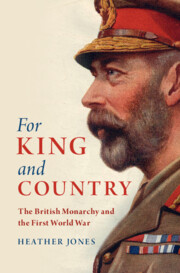Book contents
- For King and Country
- Studies in the Social and Cultural History of Modern Warfare
- For King and Country
- Copyright page
- Contents
- Figures
- Table
- Acknowledgements
- Introduction
- Prelude The Monarchy and Wartime Political Power
- Part I The Role of the British Monarchy in Cultural Mobilisation for War
- Part II The Emperor’s New Clothes
- 3 The Royal Body in Wartime
- 4 De-Sacralisation Discourses
- Part III The Unknown Soldier
- Conclusion
- Notes
- Bibliography
- Index
4 - De-Sacralisation Discourses
Challenges to the Monarchy’s Status, 1916–1918
from Part II - The Emperor’s New Clothes
Published online by Cambridge University Press: 09 September 2021
- For King and Country
- Studies in the Social and Cultural History of Modern Warfare
- For King and Country
- Copyright page
- Contents
- Figures
- Table
- Acknowledgements
- Introduction
- Prelude The Monarchy and Wartime Political Power
- Part I The Role of the British Monarchy in Cultural Mobilisation for War
- Part II The Emperor’s New Clothes
- 3 The Royal Body in Wartime
- 4 De-Sacralisation Discourses
- Part III The Unknown Soldier
- Conclusion
- Notes
- Bibliography
- Index
Summary
This chapter examines the challenges that the second half of the war presented to the British monarchy’s sacralised status. It examines the impact of anti-monarchist revolution in 1916–22 in Ireland and in 1917–18 in Continental Europe upon the British monarchy and the way that courtiers reacted in response to such challenges and successfully re-sacralised the monarchy by associating it with ‘democracy’. It also examines the reasons why the monarchy’s German origins only became an issue relatively late in the war. Overall it finds very limited levels of wartime anti-monarchism in Britain, in contrast to the situation in Ireland.
- Type
- Chapter
- Information
- For King and CountryThe British Monarchy and the First World War, pp. 245 - 322Publisher: Cambridge University PressPrint publication year: 2021

